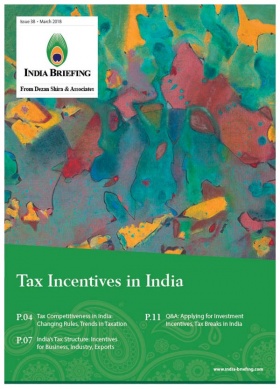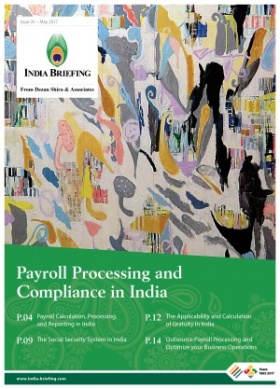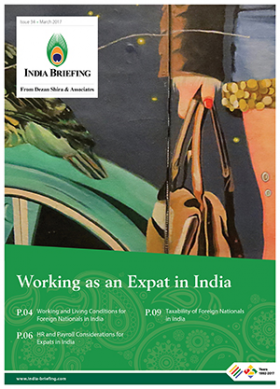Navigating HR Due Diligence in India
Foreign companies entering the Indian market cannot fail to note the potential of the country’s large and diversified labor pool.
India is currently coming into a unique demographic dividend and has a high working age population, while accelerated economic growth has increased the demand for skilled manpower.
It, therefore, becomes essential for foreign companies to conduct thorough due diligence when navigating India’s human resource (HR) environment, which is filled with a myriad of considerations that do not exist in other emerging economies.
Typically considered a ‘soft’ concern under pre-investment diligence checks, HR due diligence has an expanded scope in India.
It constitutes understanding the country’s system of employment contracts, labor laws, labor relations, regulatory policies, work culture, and industry standards.
Identity markers such as class, caste, gender, ideology, religion, and tribe, among others, greatly influence labor relations in any of India’s distinct regions and must be fully understood prior to market entry.
Securing against all possible risks
Paying attention to HR due diligence actually safeguards a venture from both operational and financial risks.
- Operational risks
Such risks include a high employee turnover rate, problematic labor relations, and differences over work culture.
Firms entering India must safeguard against risks while hiring employees, particularly in senior positions.
Conducting HR due diligence may reveal prospective candidates to have committed fraud in terms of inflating their resumes, educational qualifications, previous salary structure, and omission of recorded instances of previous misconduct.
Comprehensive due diligence checks can flag other HR-related concerns such as reputational risks (criminal and/or litigation records of prospective employees), and should also include credit checks and feedback on the prospective candidate’s personality and suitability to the hiring company’s work culture.
- Financial risks
This area of due diligence involves investigating specific costs, such as the human resource related run-rate costs of the target company, financial obligations of starting fresh operations or the prospective transaction, and lack of funds for benefit plans.
Employment contracts and labor laws
Labor laws in India provide for a minimum of guarantees and benefits to all employees that can supersede the provisions of labor contracts.
For example, a termination policy outlined within the contract should be verified against the current law prior to it being carried out.
In India, companies that employ more than 100 workers need the government’s permission to conduct layoffs.
There are three types of employment contracts in India – permanent (direct) contracts, fixed contracts, and temporary contracts.
Besides company rules and regulations, employers are advised to incorporate the following clauses into contracts – non-disclosure, employee poaching, unfair competition, trademarks, patents, and trade secrets.
Labor laws in India apply according to the category into which an employee falls. Employees may be divided into two broad categories.
- Managerial personnel
These are employees who perform managerial, administrative, and supervisory functions.
They are governed by the terms and conditions of their contracts of employment, service rules, and agreements as negotiated with their employer, and enjoy less protection from existing labor laws as compared to the ‘workmen’ category.
- Workmen
These are employees who perform non-supervisory duties, which include manual, unskilled, technical operations, and clerical work.
Workmen are specifically provided with various protections, social security measures, and benefits and amenities through the country’s labor laws.
Trade unions
India’s trade union movement is rooted in the country’s early acceptance of a mixed economy – incorporating both socialist and capitalist systems.
According to the law, where the number of blue-collar workers at a location exceeds seven, they are entitled to form a union to improve their ability to negotiate remuneration and other terms of employment.
All unions in India are tracked by the Labour Bureau, Ministry of Labour and are regulated by the Trade Union Act (1926).
The latest data, released for 2012, showed an estimated 16,154 trade unions in India, with a combined membership of 9.18 million.
Trade unions at the firm or industry level are often affiliated to larger federations.
The largest federations are at the national level and are called the Central Trade Union Organizations (CTUO).
Companies should also note the significance of the particular political and ideological affiliations of the trade union(s) to which their employees belong.
Work culture
In India, the workplace set up is often hierarchical with clear boundaries between management levels.
The country’s business etiquette is a combination of Western and Eastern practices, but local customs do permeate relationships.
These need to be acknowledged for successful business interactions.
For instance, when giving feedback, an understanding of honor-shame becomes important in the Indian context, which can otherwise be inadvertently interpreted as unconstructive criticism.
Due diligence checks for business integration
Aside from country-specific considerations, there are several critical HR due diligence checks that need to be performed if a foreign company is looking to establish a joint venture, a business alliance, or secure a merger and acquisition.
Such checks help discover hidden liabilities while integrating business operations.
- HR policies and governance, talent management, and employment demographics
These inform the HR organizational design, identify the top levels of management, assessment of critical players, deployment of appropriate resources, retention of key people, and communications strategy development.
It is also necessary to examine any trade union associations and collective bargaining mechanisms of the employment personnel.
- Compensation structure of the target company
This is one of the biggest costs incurred while conducting business.
It typically comprises a base salary, an annual incentive and/or a long-term incentive.
The change in ownership may result in the acceleration of payment of severance packages, and establishing their timing and who will bear the financial responsibility are key functions of the due diligence process.
Firms will have to agree on the expatriate cost sharing arrangement, if applicable.
- Benefit plans of the target company
To avoid differences on funding requirements, it is important to agree on the company’s respective benefit policies such as retirement benefits/pension funds (minimum contributions versus stable yearly amount), leave encashment, and medical insurance, among others.
This article is amended from the issue of India Briefing Magazine titled “Pre-Investment Due Diligence in India” where we highlight the different regulatory, tax, and socioeconomic issues that a company should consider before entering the Indian market.
About Us
India Briefing is published by Asia Briefing, a subsidiary of Dezan Shira & Associates. We produce material for foreign investors throughout Eurasia, including ASEAN, China, Indonesia, Russia, the Silk Road, & Vietnam. For editorial matters please contact us here and for a complimentary subscription to our products, please click here.
Dezan Shira & Associates provide business intelligence, due diligence, legal, tax and advisory services throughout India and the Asian region. We maintain offices in Delhi and Mumbai and throughout China, South-East Asia, India, and Russia. For assistance with India investment issues or into Asia overall, please contact us at india@dezshira.com or visit us at www.dezshira.com.
- Previous Article Visakhapatnam: Invest in India’s Leading Port City
- Next Article Business Branding versus Economic Reforms: An Updated View of Modi’s India
















